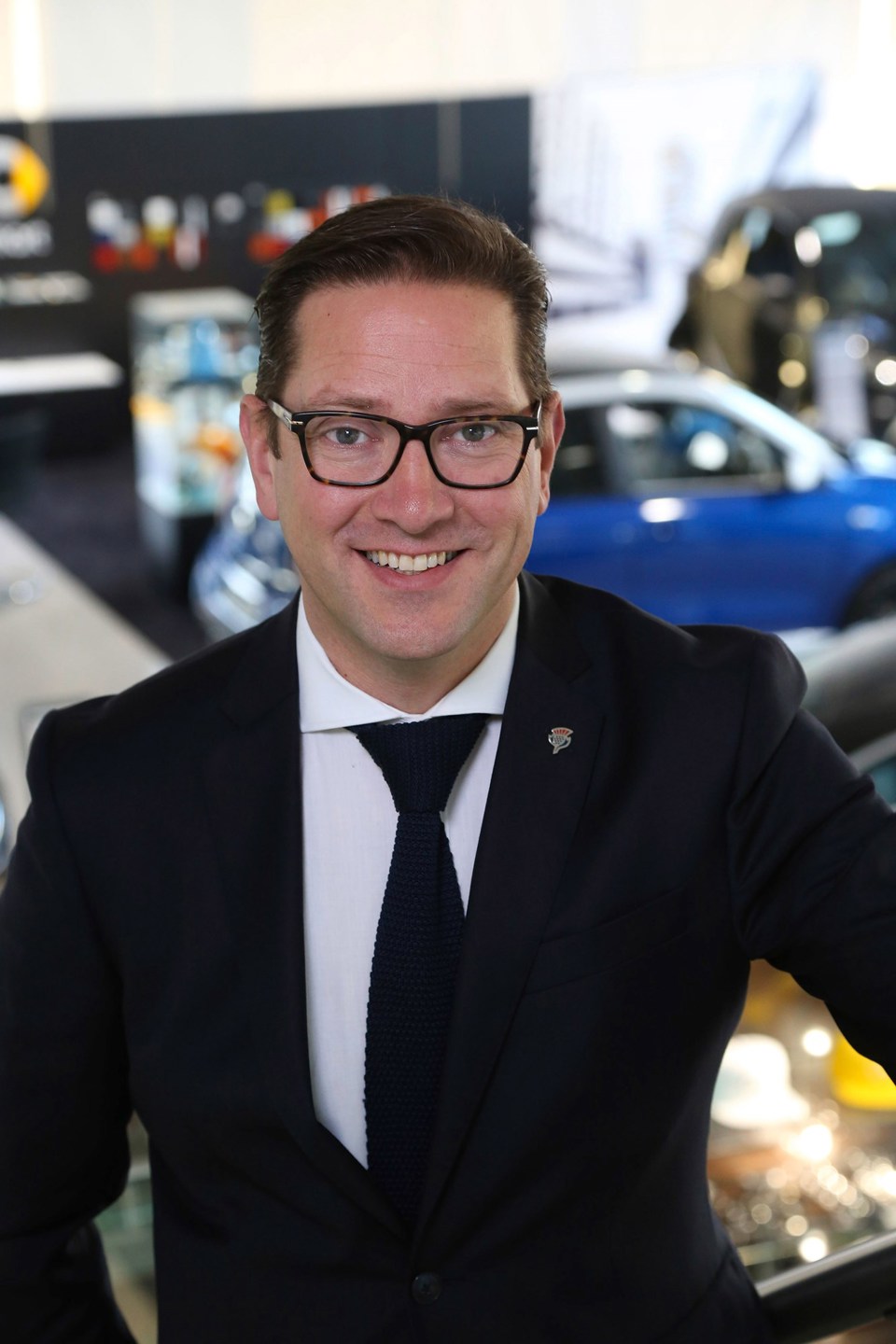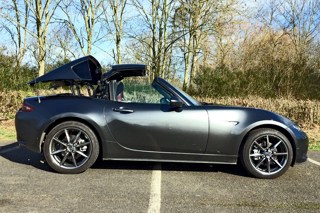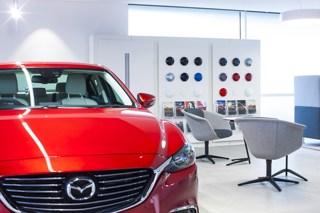Jason Cranswick, commercial director at Jardine Motors Group, has finished showing me around the group’s new flagship Jaguar Land Rover dealership at Milton Keynes – it’s a multi-million pound blueprint for what JLR expects of the ‘Arch’-style centres. Next door is its Audi showroom, an £8 million investment completed in 2014.
Across England are more examples of considerable investment and pride in its motor retail operations. Its next is an £8m Audi site at Oldham, due to open this summer, followed by its fourth Porsche centre, at Sidcup, before the end of the year.
“One thing we’re very fortunate with is that our shareholder takes a very long-term view on the industry. We’ve done the usual examination of what’s the future of retailing, what will we need, and we’re convinced that there’s absolutely a place for facilities such as this. You’re probably going to have fewer locations, fewer partners and more impressive facilities.”
"Historically, I think dealer groups have been reliant on the drive and the focus and the energy of the manufacturer to determine the pace and the direction from which our innovations come. What we’ve now said is that we have a responsibility to look at that process as well, and we’re working very hard to at least keep up with what the OEMs want, and in certain places maybe even overtake the current status, just so we keep ahead.”
Jason Cranswick, commercial director at Jardine Motors Group, has finished showing me around the group’s new flagship Jaguar Land Rover dealership at Milton Keynes – it’s a multi-million pound blueprint for what JLR expects of the ‘Arch’-style centres. Next door is its Audi showroom, an £8 million investment completed in 2014.
Across England are more examples of considerable investment and pride in its motor retail operations. Its next is an £8m Audi site at Oldham, due to open this summer, followed by its fourth Porsche centre, at Sidcup, before the end of the year.
“One thing we’re very fortunate with is that our shareholder takes a very long-term view on the industry. We’ve done the usual examination of what’s the future of retailing, what will we need, and we’re convinced that there’s absolutely a place for facilities such as this. You’re probably going to have fewer locations, fewer partners and more impressive facilities.”
That shareholder is Jardine Matheson, an Asia-based conglomerate that bought its way into the UK motor retail sector in 1981 with a takeover of Lancaster, and numerous acquisitions since, until it reached the top 10 of the AM100.
 Cranswick said the parent group is very “empowering”, giving UK chief executive Neil Williamson and the management team their trust and support to develop the business, and keen to examine the successful initiatives of the UK dealerships, which trade under the Lancaster brand.
Cranswick said the parent group is very “empowering”, giving UK chief executive Neil Williamson and the management team their trust and support to develop the business, and keen to examine the successful initiatives of the UK dealerships, which trade under the Lancaster brand.
Cranswick added: “Our shareholders are incredibly supportive of what we are doing here. I think the UK has become a benchmark market for other global markets. Our colleagues from Asia are looking here for things that we might see as business as usual but they’ll see as great innovation – video technology for example.”
The most crucial development is smoothing out the bumps in the customer’s buying process. That has meant putting equal focus on digital and physical, and the creation of specific management responsibilities in the past 18 months, such as head of digital Alex Brown, head of innovations Conal Furie, who oversees the technology employed by the group, plus a full-time in-house property management team which manages all the dealership developments.
Cranswick added: “Now it’s all around innovation, so how do we link up the different parts of the business using technology?” Most of Jardine’s sites have a car park host, and one of the first projects Furie stewarded was a trial of automatic number plate recognition at Jardine’s Milton Keynes dealerships. As a car drives on to the premises this information is transmitted to the host, who is armed with a tablet computer. The customer is met at their car and accompanied to reception where a hot drink is prepared based on their preferences from previous visits.
Or, if it is a service customer, they are directed to the drive-in service lane where they are met by two people – one focused on the customer and the other focused on doing a walkaround video appraisal of the car. The car drives over a Hunter drive-on diagnostic platform which automatically monitors tyre pressure and tread depth, and in the service lane the customer can exit their car and enter a waiting courtesy car while completely protected from the weather.
Technology also ensures the customer is educated – about 48 hours before their service appointment, the dealership sends an email reminder with a short video explaining how the drive-in service works.
Making life simple
Furie’s mammoth task is working out how the group can join up the various technology and data at its fingertips, such as CDK’s Autoline dealer management system, Manheim’s RTC (rebranded XTime) workshop management software and CitNow video in sales and service. The aim has to be making life more simple, more connected and more intuitive, said Cranswick.

That has led to development of Jardine Vision, a single front-end system through which all the different portals will be accessed in future. In partnership with developer Dealerweb, the system went live with a focus on the sales environment, but it is updated monthly and will bring in aftersales in the near future.
The dealer group recently worked with an agency to analyse customer feedback, to determine how to improve their experience. The three key messages were about saving their time, building their trust and treating them more as individuals.
“The challenge we have, with 23 brands, 70 locations and 3,500 staff, is how you deal with making it personalised, but in a way that’s consistent to Jardine,” said Cranswick.
This led to the development of the Jardine Core Process, an element that contributed to the group winning the 2017 AM Award for Excellence In Customer Service, its latest trophy alongside its 2015 AM Award for Best Fleet Operation (2015) and a number of accolades from partners such as Audi and Auto Trader.
The Jardine Core Process came about after 40 employees, randomly selected from different franchises, locations and disciplines within the dealer group, met in a room armed with marker pens, post-it notes and customers’ direct feedback, with an aim to define a strategy that could be rolled out across the business and would live up to Jardine’s mission statement of being the best motor dealer judged by its customers, staff and suppliers.
The employees broke down the experience into sections, each in a manual for easy navigation. Examples of the sections include ‘vehicle journey’, focused on total vehicle care from arrival to customer handover; the ‘vehicle of interest journey’, to deliver a professional experience offering all relevant and available products and services, so meeting any customer need; and the ‘part-exchange journey’, to make customers feel their trade-in is really valued.
With eight booklets and a website full of online resources, an implementation team visited every site to impress on everyone the importance of consistency in customer service, and the Jardine Core Process has been integrated into the induction process for every new starter. After implementation, a business improvement team continues to support and promote every employee’s online self-assessment, which is monitored by the customer service team with live reporting at franchise, dealership and individual levels, to ensure the business can measure the levels of customer service at any point. Consistency is also monitored in other ways, such as online feedback submissions and customer focus groups.

“We’ve not gone in saying ‘you can only do it that way’, but what we’re saying is ‘a really good way to do this would be this way’,” said Cranswick.
“We’re still allowing the latitude and flexibility that’s needed. We’re doing for our team members what we do for our customers: we give them an environment they can personalise, technology that helps save their time, and deal with them in a way that shows we trust them and they trust us.”
He said creating a good, consistent experience is more easy in Jardine’s luxury brands with small volume, but the challenge is doing the same in its premium and near-premium dealerships, which handle high volume.
“The facilities play a huge part, and knowledge plays a huge part, but we must not lose sight of the fact that it’s the human touch as well. A lot of consideration has gone into what we do to make it a high-performing, consistent, but warm and prosperous environment.”
Rising wages bill
Cranswick said Jardine has increased its ratio of staff per customer, but it is convinced this is necessary to deliver the service, which in turn delivers retention and longer-term profitability. Strip out some of those layers and it creates lag or fractures in the overall experience, he said.
Of course, having a portfolio heavily biased to premium and luxury brands, with the associated profitability, allows it to make such investments. Companies House records show that from 2013 to 2016, the group’s wages bill has increased by £10m to £89m and there are an average of three more people per location. In the same period, operating profit rose by 50%, from £15m to £22.7m.
Cranswick said many parts of the industry tend to be quite insular and seek to keep the good ideas to themselves. Jardine has chosen to collaborate, to be transparent with its car brands and to share ideas if they want them. Cranswick describes motor retail as “one ecosystem” where the retailer and the manufacturer co-exist and the environment has to be seamless and integrated.
The dealer group also looks at other industries, in retail, service or hospitality, to garner more ideas, and it has the benefit of being part of a global business that pulls in expertise from across its companies to brainstorm and problem- solve. Cranswick is among employees who have worked on Jardine Matheson’s ‘Innovate Jardine’s Challenges’. The programme was launched in 2016 by Ben Keswick, Jardine Matheson’s managing director, with the message that “innovation requires a culture which accepts that mistakes will be made” as the corporation tries new things, because that is how it learns and moves forward.
In 2016, the dealer group also launched a type of internal social network, developed in-house, which enables any employees to share their ideas and best practice and allows its business leaders to appeal for input and solutions to problems across the business.
Cranswick said the company’s viewpoint is that it employs highly qualified automotive professionals and consequently wants to give them a successful environment in which to work. That means empowerment and responsibility at a local level, in recognition that general managers and department heads should know their market better than anyone else. But at the same time, they can benefit from the resilience and support of the group structure.
There are six divisional directors, each responsible for specific brand relationships and performance, plus central support through all divisions for HR, marketing, finance, customer service and business development. It brings the additional benefit that new starters can easily identify their role, their support structure and the general way the group conducts its business, he said.
Key values are judgement, integrity and ownership and Cranswick said the group is consultative, but encourages colleagues to make a decision. He added: “Hopefully, what we do is speed up the decision- making process. Certainly, with a customer we would expect a first-contact resolution. We don’t want problems being passed from colleague to colleague. I know it sounds like a cliché, but we often talk to our colleagues about doing the right thing.”
Doing the right thing applies to group strategy too. Last year it acquired Colliers Motor Group in a £23m deal, boosting its Honda, Jaguar and Land Rover representation, and took over Harwoods Land Rover in Tonbridge, spending another £9.3m.
This year it has bought BMW and Mini dealer Carrs in Bury St Edmunds as part of its aim to expand its BMW relationship – it represents the German premium brand in one other location, Milton Keynes. However, at the same time, Jardine reduced its representation of Toyota and Lexus, selling eight businesses to Steven Eagell Group and retaining just one Toyota site in Essex and two Toyota dealerships in the north-east of England, which Cranswick described as long-established, valuable operations that will be retained and developed.
Cranswick said Jardine is keen to develop with all its franchise partners, to build a really great business for the long term.
But back to that mission statement. The stated aim of being the best as judged by staff, suppliers and customers is a bold one. Cranswick said the business is heading in the right direction, but “the reality is being the best is a never-ending pursuit. Over the last couple of years, we’ve definitely moved up in the eyes of all our OEM partners. We’re honest and say there’s still some work to do in some of our businesses, but we have the right spirit, the right working methods, the right commitment and you won’t ever see complacency.”
Armed forces recruitment trial
Jardine is involved in a pilot scheme with Audi to specifically target experienced armed forces engineers reaching the end of their term of service. Working with the car brand, it has developed a fast-track development programme, under which they are employed by Jardine and sent for block release training by Audi to adapt their existing skills towards motor retail.
“It’s another way of finding engaged, motivated, committed individuals who have a skillset and a disciplined mindset, are used to process, and are very engaged with the technical aspects,” said Cranswick. The first cohort of a dozen recruits begins training this summer.
The group also recruits university leavers for sales and service advisor roles. Its recruitment team conducts an extensive application and assessment process, which includes requiring applicants to send a personal video for the group to assess their interpersonal skills, prior to deciding who to interview.
The chosen candidates are placed with dealerships, but undergo a 12-month development programme with the Jardine Academy. Two cohorts are under way, and another will begin later this year. “The idea is within a 12-month period they will have gone from high potential and low knowledge to very high potential and high knowledge. We see it as our responsibility to find, develop and keep those individuals,” Cranswick said.
Jardine has also recruited people into freshly created roles of assistants and support teams, including product geniuses, designed to take some of the burden off traditional sales and service personnel so there’s more focus on the customer experience. “It’s a bit of a leap of faith because you have to make the investment in resource before you get the returns in revenue. But all of us had looked at the industry and been frustrated as to why it was always as it was.”
Login to continue reading
Or register with AM-online to keep up to date with the latest UK automotive retail industry news and insight.




















Login to comment
Comments
No comments have been made yet.